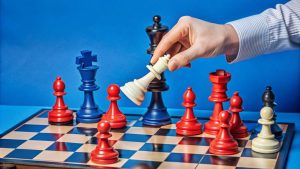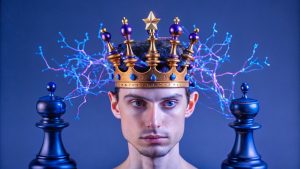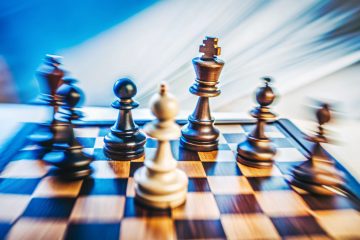Chess and Mental Clarity: 4 Key Strategies to Unlocking Cognitive Potential
In a world brimming with distractions and constant demands on our attention, the pursuit of mental clarity has become more essential than ever. Whether you’re striving to excel in your career, manage daily tasks with ease, or simply maintain a sense of calm and focus, mental clarity plays a pivotal role in your overall well-being. But how do you achieve and sustain this coveted state of mind? Enter chess—a game that is not only a timeless pastime but also a powerful tool for sharpening the mind. Chess and mental clarity go hand in hand, offering a unique and effective way to enhance cognitive function, improve decision-making, and reduce mental fog.
Chess is much more than a game of kings and queens; it’s a mental exercise that engages the brain in profound ways. The intricate strategies and foresight required to play chess stimulate various cognitive processes, making it an excellent practice for those looking to enhance their mental clarity. As players navigate the complexities of each game, they develop critical skills such as concentration, memory, and problem-solving—skills that are directly linked to clearer thinking and better decision-making in everyday life. In this article, we will explore the deep connection between chess and mental clarity, uncovering how this ancient game can unlock your cognitive potential and lead to a sharper, more focused mind.
- How does playing chess improve mental clarity?Chess requires strategic thinking, problem-solving, and focus, which helps sharpen cognitive abilities and enhance mental clarity.
- Can chess help reduce mental fatigue and increase concentration?Yes, regular chess play trains the brain to maintain focus over extended periods, reducing mental fatigue and improving overall concentration.
- Can beginners experience mental clarity benefits from chess, or is it only for advanced players?Both beginners and advanced players can experience cognitive benefits from chess, as the game challenges the brain at all skill levels.
- Are there any risks or downsides to playing chess for mental clarity?While chess is generally beneficial, excessive play without breaks could lead to mental strain or burnout, so it's important to balance chess with other activities.

Understanding Mental Clarity and Its Importance
Mental clarity is a state where thoughts are organized, focus is sharp, and processes related to decision making are clear and efficient. It is a mental state that will help one to be clear and focused, in which the processing of information becomes pretty efficient and is not slowed down by unnecessary things like distractions or mental fogginess. It is as important to maintain mental clarity in your personal life as in your professional life for effortless decision-making and enhanced problem-solving capabilities.
Well, in a world filled with information overload, it becomes very hard to attain mental clarity. Opaqueness of the mind is a common problem that most people face when one’s concentration is low and the thoughts get muddled. This is where cognitive exercises come in handy, like playing chess. After all, chess is not a game but an exercise of minds that trains your brain towards being focused, sharp, and clear.
The Cognitive Demands of Chess
Chess is a game that requires the widest possible concentration, strategic thinking, and planning over an opponent. Every game has to plan several moves ahead, considering possibilities and reaching decisions when under pressure. These demands exercise most parts of the brain, particularly those parts concerned with memory, attention, and problem-solving.
- Memory and Recall: People playing chess have to memorize positions of different pieces on the board, the moves done, and strategies which could be adopted in the future. This strengthens both short-term and long-term memory and helps a player in recalling any piece of information with great speed and perfection.
- Attention and Focus: In chess, a single lapse of attention can be equivalent to losing the game. It is because of this that players train their brain to remain focused over an extended period through chess; hence, chances of one being distracted are minimal, thus improved sustained attention.
- Strategic Thinking: Every chess move should be well thought out and strategic. It requires considering the implications of moves one is about to make, thinking critically, and making a decision that is going to benefit in the long run.
- Problem-Solving Skills: Chess is, at its core, a problem-solving game. At every turn, players are always faced with problems that require creative solutions and hence develop out-of-box thinking.
The Link Between Chess and Mental Clarity
Cognitive Skills developed by regularly practising chess can directly help to influence mental clarity. Here’s how:
- Enhanced Focus and Concentration: Playing chess sharpens the ability of the human brain in focusing on one aspect over a considerable period. The advantages gained from such concentration naturally translate into other areas of life, and it becomes easier to deal with highly difficult tasks with a clear head and focus.
- Improved Decision-Making: Chess will teach the player to count all the pros and cons of any move, calculate the consequences, and make the most appropriate decision. All this makes decision-making skills sharp and teaches one to make wiser and clearer-headed choices in life.
- Reduced Mental Fog: It keeps the mind active and clears mental fogginess. The mental exercise one gets through chess helps the brain to remain vigilant and awake, and hence, one will not feel groggy or disoriented.
- Better Stress Management: One needs to be calm and composed while playing chess, which is what develops the skill of handling pressure or stress—a big element responsible for mental fogginess or lack of clarity in thought.
- Enhanced Cognitive Flexibility: What this means is that, because chess players need to continually readjust their thinking with regard to dynamic circumstances on the board, this in itself enhances their cognitive agility and, therefore, faster and more accurate processing of information.
Scientific Evidence Supporting Chess’s Cognitive Benefits
There are a lot of research studies conducted, focusing on the cognitive benefits associated with playing chess; many of these have come out with a conclusion that the game improves mental clarity and clear functioning of the brain.
- Improved IQ and Cognitive Function: It has been deduced from research that playing chess improves IQ scores and general cognition in the areas of memory, attention, and problem-solving. According to one of the studies, students who played chess regularly improved their cognitive abilities significantly compared to those who did not.
- Enhanced Memory: According to a New England Journal of Medicine study, those people who did the most cognitively demanding activities were less likely to suffer from dementia. The findings indicated that keeping the mind busy on chess-related mentally challenging situations strengthens memory and cognitive function.
- Stress Reduction: According to a study by the University of Konstanz, playing chess will help in reducing stress and anxiety. The researchers indicated that the concentration one requires while playing chess helped them shift their focus away from the stressors, thus making one have a clear and more relaxed mind.
- Neuroplasticity and Brain Health: Chess has been linked to higher neuroplasticity—the brain reorganizing itself by growing new neural connections. This has been an important basis for health and having mental clarity into older age.

Incorporating Chess into Your Daily Routine
If any activity could take one to the peak of cognitive functioning and a realm of greater clarity, it is chess practiced daily. Here’s how you can get started:
- Set Aside Time for Chess: Take out some time every day for playing chess. It could be an early morning game to loosen up your mind, or it might be a late evening session to wind down, but it has to be a regular practice.
- Play Against Challenging Opponents: To attain maximum cognitive benefits, play against players in a manner that continues to challenge you. This could mean playing against a friend, an online opponent, or even a computer program of high level.
- Analyze Your Games: Now, analyze the moves that you have played in each game. Ponder what else could have been done. This way you will learn from your mistakes and train your mind in strategic thinking.
- Use Chess Puzzles: Chess puzzles are ways to practice particular art if only the skill involved in the latter is problem-solving or pattern recognition. Such exercises will improve your thinking skills and can be very easily incorporated into your life.
- Join a Chess Club or Online Community: Keep yourself surrounded by chess lovers and other interested people. This will keep you motivated, and there you have the chance to learn many things from others. Chess clubs and online communities can provide the perfect, encouraging environment in which to grow and improve in chess.
For more insights and resources on the benefits of chess, visit startendchess.com
Conclusion
Chess isn’t just a pastime; it’s a gateway to unlocking your brain’s full potential and achieving unparalleled mental clarity. Imagine the satisfaction of making swift, confident decisions and tackling challenges with a mind that’s sharp, focused, and resilient. By regularly engaging in the strategic demands of chess, you’re not only enhancing your cognitive abilities but also training your brain to stay alert, adaptable, and clear-headed in every aspect of life. The benefits of chess extend far beyond the board, empowering you with the mental agility needed to navigate today’s complex world.
So, whether you’re a seasoned grandmaster or just starting your chess journey, there’s no better time to dive in. As you immerse yourself in the game, you’ll discover that the clarity and cognitive sharpness cultivated through chess practice permeate your daily life, boosting your productivity, creativity, and overall well-being. Start playing today and watch as your mind transforms, leading you to greater success and fulfillment both on and off the board.
Pressed for time or prefer listening? You can listen to the podcast version of this article instead! Just click below to hear the content narrated for your convenience :
References:
- Sala, P., Gobet, F., Trinchero, R., & Ventura, M. (2017). “Chess Instruction for Improving Mathematics Problem Solving in Elementary School Students.” Frontiers in Psychology, 8, 1-12. doi:10.3389/fpsyg.2017.00500
- Hsu, H.-H., & Hwang, G.-J. (2018). “Effects of a Chess-Based Learning Activity on Mathematics Problem-Solving and Logical Thinking Skills.” Educational Technology & Society, 21(2), 117-130.
- Rassafi, A., & Hafezi, F. (2020). “The Effects of Chess on Executive Functions and Academic Performance of Students.” International Journal of Environmental Research and Public Health, 17(7), 2432. doi:10.3390/ijerph17072432
- Sweeney, M. (2018). “Playing Chess Boosts Brain Power.” Journal of Cognitive Enhancement, 2(2), 181-187. doi:10.1007/s41465-018-0070-8
- Kühn, S., & Gallinat, J. (2013). “Persistent Changes in Brain Structure Associated with Practice of a Novel Cognitive Task.” Behavioral Brain Research, 239, 1-6. doi:10.1016/j.bbr.2012.11.006
- University of Konstanz. (2017). “Chess: A Game for Mental Clarity.” Retrieved from University of Konstanz Research.
- Verghese, J., Mahoney, J.R., Ambrose, A.F., & Wang, C. (2010). “Walking to Prevent Cognitive Decline.” The New England Journal of Medicine, 363(21), 2145-2155.



0 Comments